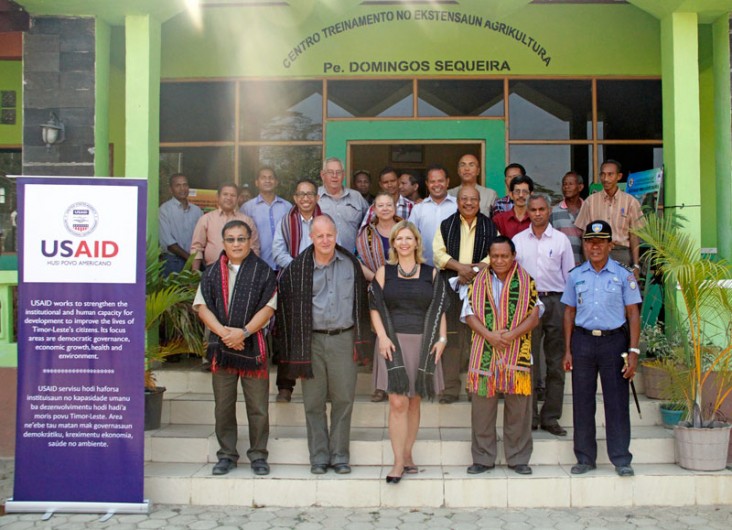
USAID closes its Consolidating Cooperative Agribusiness Recovery (COCAR) project, U.S. support continues through U.S. Department of Agriculture
For Immediate Release
Dili, September 25, 2014–On September 23, 2014, the United States Agency for International Development (USAID) and the National Cooperative Business Association (NCBA) commemorated the end of 20 years of USAID support to the Timorese coffee sector during a showcase for USAID’s Consolidating Cooperative Agribusiness Recovery (COCAR) project. During the event, participants visited Cooperativa Café Timor (CCT) and NCBA facilities in Dili, Railaco, and Tibar. There, they learned about the success achieved through USAID’s long-term support for the Timorese coffee sector as well as ongoing diversification activities which are allowing CCT coffee farmers in rural Timor-Leste to expand beyond coffee into other crops such as black pepper, cacao, vanilla, and cassava.
During the ceremony, the Ministry of Agriculture and Fisheries’ National Director of Food Security and Cooperation Gil Rangel stated, “USAID’S support to the nascent coffee sector in Timor-Leste began more than twenty years ago–well before Timor–Leste’s independence. Since that time, USAID has helped to develop a sustainable and profitable coffee export sector.”
As CCT became stronger, USAID support moved away from coffee processing to help farmers increase their yields and support CCT/NCBA scale up this successful model to other types of crops and in support of more farmers. CCT General Manager Sisto Moniz Piedade explained, “USAID's assistance expanded to also cover other activities such as coffee rehabilitation, cattle fattening, agro-forestry, vanilla, cocoa, and cassava. This assistance has improved the farmers’ livelihoods and connected Timor-Leste to the international market through exports.”
Chargé d’ Affaires Katherine Dueholm stated, “We are celebrating a real achievement. After twenty years and $24 million dollars in U.S. support, the CoCAR project is self-sufficient and 138,000 Timorese benefit from it. The challenge now is to expand and diversify; we will continue to support that effort by bringing in new resources from the U.S. Department of Agriculture.”
The success of the partnership between USAID, NCBA, and CCT attracted the attention of the New Zealand Government, which added funding to USAID’s project to expand coffee farm rehabilitation activities. New Zealand Ambassador Jonathan Schwass commented, “The partnership with USAID, NCBA, and CCT has allowed us to build on the close to two decades of work by those organizations in building up a viable and sustainable coffee export in Timor-Leste.”
Closing the ceremony, Vice Minister of Commerce and Industry Abel Ximenes recalled the challenges from the inception of the project and thanked the United States for its assistance in bringing the project to fruition. COCAR supported Timor-Leste’s economic growth by increasing productivity in the agricultural sector. The project worked with CCT to increase income-generating activities for CCT farmers in the rural highlands through crop rehabilitation, intercropping, and crop diversification. Through assistance from the Governments of the United States and New Zealand, CCT farmers have diversified their production, enabling greater financial security and a steady stream of income throughout the year. This, in turn, can reduce the risk of lean periods related to reliance on a single crop lead and improve household nutrition. In addition, COCAR empowered Timorese women as economic actors in the communities where they work and supported the delivery of health care services to CCT members through mobile clinics and community health extension teams.
While the showcase event marked the end of USAID’s 20 years of assistance to the Timorese coffee sector, the U.S. Government will remain engaged through the U.S. Department of Agriculture (USDA). Through a grant to NCBA, USDA will fund rehabilitation of additional coffee farms as well as crop diversification activities for the next three years. New Zealand will also continue its support to the sector for the foreseeable future.







Comment
Make a general inquiry or suggest an improvement.